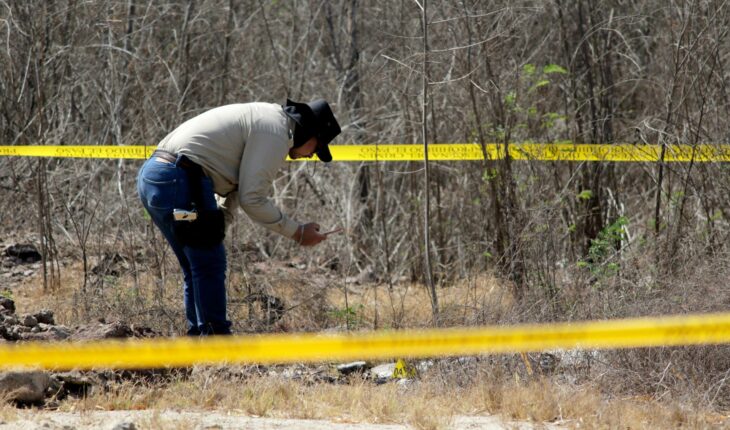Currently there are 52 thousand unidentified bodies in the forensic services and in the mass graves of the country, according to data from the National Movement for Our Disappeared, cited by the Undersecretary of Human Rights, Alejandro Encinas.
Since 2019 the government has conducted a census of human remains and unidentified bodies in Mexico, from which 37 thousand people were registered: eight thousand in forensic services and the remaining 29 thousand in mass graves.
However, since that year different organizations and institutions have registered other figures, such as the Fifth Element Research Laboratory, which reported 39,000 bodies and the National Census of The Attorney General’s Office of Inegi, which registered only nine thousand 400 people.
But the figure that the government took up was that of the National Movement for Our Disappeared, which – based on requests for information and fieldwork – raised a record where it counted more than 52,000 unidentified bodies.
He also found that 80% of the total number of people is concentrated in 10 states of the country, led by Baja California, Mexico City, State of Mexico, Jalisco and Chihuahua.
Unidentified deceased persons, National Movement for Our Disappeared.
At the morning conference, the Undersecretary of Human Rights noted that there is no census on the unidentified bodies, nor on those identified and unclaimed in the mass graves.
“This is a very serious legal omission that involves different areas of authorities, from the Prosecutor’s Offices or Secretariats of Health or Courts, to municipalities, for the management of mass graves in cemeteries,” he said.
Read more: ‘They lost videos and a chip’: relatives of disappeared in CDMX protest the negligence of the Prosecutor’s Office
In addition, he stressed that nor is there a national genetic database that allows the comparison of the data obtained from the genetic samples taken by the families, with those that are raised from the bodies found.
“This genetic information is not shared, it is not contrasted, there are no capacities and wills and that is the main problem, lack of will to do it in a massive way and forensic information remains fragmented, this speaks of the fact that there are not only human institutional capacities, but also a lack of political will at the state level to face this crisis.”
Undersecretary @A_Encinas_R reports that, according to data from the Movement for Our Disappeared, there are more than 52,000 unidentified bodies in mass graves and foreign services in the country. 10 states concentrate 80% of these bodies, he says. pic.twitter.com/jCMMNMZ6Q7
— Animal Político (@Pajaropolitico) March 17, 2022
By expounding on what he has described as the “forensic crisis“, Encinas stressed that the budget allocated for the identification of the bodies in 2022 – among what is allocated to the National Search Commission, and what is destined to the states – totals more than 3,400 million pesos, “a unique investment that seeks to face, stop and reverse this situation.”
Among the actions that are being carried out to combat the “forensic crisis” is the signing of a collaboration and training agreement between the National Institute of Genomic Medicine and the Genetic Identification Laboratory of the University of Innsbruck, to develop human identification capabilities with complex samples.
“That is, we want to have our Mexican Innsbruk, it is the first agreement signed by the University of Innsubruk with an institution from another country (…) the first identification work will begin in these days,” the official announced.
You may be interested: “If Andrés Manuel does not go to the graves, the graves go to him”
Creation of the National Center for the Identification of Bodies
Karla Quintana, National Commissioner for the Search of Persons of Mexico, said that with the Legal Department and the Ministry of the Interior, work is being done on the initiative for the creation of the National Center for Human Identification.
He indicated that, if the initiative passes in the Legislative Branch, the commissions will be able to search for human identification through the center with a massive focus and that it would be dedicated exclusively to disappeared persons.
Faced with the crisis of disappeared people in Mexico, Commissioner @kiquinta says that there is a proposal to build a national forensic center; that the generic databases of the prosecutor’s offices be homologated, and that forensic services be regulated. pic.twitter.com/TEh3iaZXv2
— Animal Político (@Pajaropolitico) March 17, 2022
Another of the actions that are foreseen for the Attention to the forensic crisis, he said, are actions such as the National Conference of Secretaries of Public Safety sharing information from databases and having a repository of this.
In addition, the strengthening of expert services, promoting an official Mexican standard for the protection of bodies, sharing forensic information in the northeast of the country, comparing genetic profiles in a massive way, as well as comparing fingerprints with the INE, the SAT and banks, and integrating a national bank of genetic information.
“The dynamics of disappearance do not respect borders, it does not matter that a prosecutor’s office or a state solves a problem because the disappearance does not respect the border of the state. We have to attend globally,” he said.
What we do at Animal Político requires professional journalists, teamwork, dialogue with readers and something very important: independence. You can help us keep going. Be part of the team.
Subscribe to Animal Político, receive benefits and support free journalism.#YoSoyAnimal





